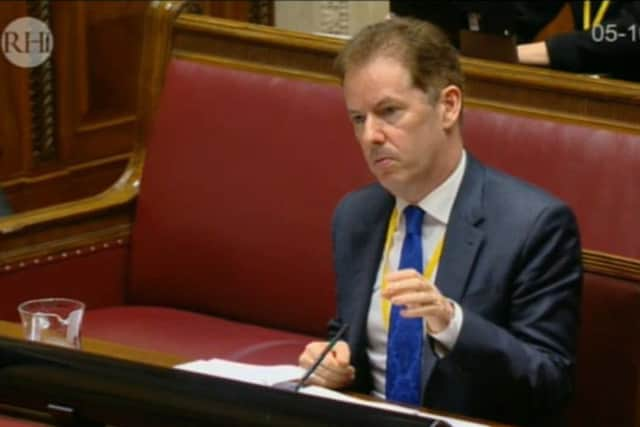RHI Inquiry: Warnings of heating empty sheds and suspicious claims not passed on by Ofgem
and live on Freeview channel 276
Yesterday the RHI Inquiry heard of a problematic relationship between what are two government departments, with even remarkable allegations of empty poultry houses being heated on the GB RHI scheme not being passed from Ofgem to Stormont.
The revelations relate to the period after 2012 when the NI scheme was operational (the GB scheme had already been operational for a year).
Advertisement
Hide AdAdvertisement
Hide AdThe inquiry has already heard how Ofgem, which as the GB energy regulator operates as a non-ministerial department and also runs some government energy schemes, tried in vain to alert officials in Arlene Foster’s Department of Enterprise, Trade and Investment (DETI) to the folly of abandoning cost controls as the NI scheme was being set up.


But once the NI scheme was up and running, Ofgem did not pass on individual examples of how the scheme was being allegedly abused.
Yesterday Ofgem chief executive Dermot Nolan, who has been in post from 2014, faced the inquiry on what was the 100th day of hearings.
The inquiry was told of a warning sent to the very top of Ofgem which highligted abuse in the GB poultry sector. It said that a farmer than ordered 33 boilers to milk the most lucrative tariff – rather than a smaller number of large boilers.
Advertisement
Hide AdAdvertisement
Hide AdOfgem did not tell DETI about the use of multiple small boilers until late 2014 or early 2015, the point at which RHI was starting to run out of control.
Inquiry barrister Joseph Aiken took Mr Nolan to an October 2014 email fwhich Ofgem received from someone in the Industrial and Commercial Energy Association.
Referring to an issue which was giving concern to some of his members, the man said: “I’m informed there are instances where end users are wasting heat in order to claim RHI (non-domestic).
“One instance was where chicken sheds are being heated when empty in order to claim the RHI.”
Advertisement
Hide AdAdvertisement
Hide AdMr Aiken said that allegation had a “particular resonance with Northern Ireland RHI” due to the major role of the poultry sector and the allegation that some sheds were being heated beyond what was necessary.
Mr Nolan admitted that the allegation should have been passed on to DETI to alert it to the issue.
Dr Keith Maclean noted that because of Northern Ireland’s disproportionately large share of the UK poultry market, it was even possible that the allegation related to a situation in Northern Ireland.
Mr Aiken said: “It’s one thing to say we didn’t communicate about ‘gaming’ [bending rules] and we should have; this is literally public money going up in smoke – you don’t need to put a ‘gaming’ badge on it.
Advertisement
Hide AdAdvertisement
Hide Ad“I go back to that central question: When you put all of this together, what is the inquiry to make of the cumulative effect of the non-communication?”
He went on: “If it were the case there were say 20 examples and Ofgem sent 15 of them across, but forgot five, the human error point that you make would obviously hold entirely.
“If it’s the case that every one of these is not communicated, is that not a major systems failure?”
Mr Nolan said he would like to “reflect on that” and respond in writing. He went on to say: “I’m afraid I don’t have a good answer to that at the moment.”
Advertisement
Hide AdAdvertisement
Hide AdOfgem was also aware of multiple articles – including in the Daily Mirror, the Guardian and Private Eye – which set out in lurid detail how people were milking the less lucrative GB RHI, with one of the articles making its way to the top of the part of Ofgem handling RHI.
Unlike some of those facing the inquiry, Ofgem has provided vast quantities of documentation to the inquiry and much of that shows how much its own staff were sharing and discussing the RHI problems – but not sharing that with DETI.
Mr Nolan said that was “sobering” but he could not adequately explain why they had failed to pass on warnings.
Barrister Joseph Aiken said it was not clear whether DETI – which has been shown to be seriously dysfunctional – would have acted on the warnings if they had been passed on, but it would at least have had the chance to make a decision.